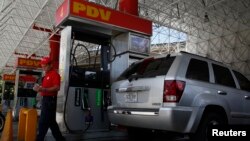President Nicolas Maduro is mulling a politically risky move to raise highly-subsidized gasoline prices in Venezuela for the first time in 17 years, but he may be put off for now by fears of a social backlash.
With 95 octane gas on sale for less than two U.S. cents a liter, most motorists can fill up for under $1. That's less than a small bottle of drinking water. Pump attendants often end up with a bigger tip than the cost of the fuel.
Subsidizing the world's cheapest gasoline costs the South American OPEC member about $12.5 billion a year, the government says.
With its finances reeling and generous welfare programs to fund, the socialist government has for months been preparing Venezuelans for a hike of the almost laughably low prices at the pump. Ministers and state media have been constantly mentioning the possibility, while the ruling party has been debating it.
Fuel prices, though, are a hot-button issue in the country with the world's biggest oil reserves, as many Venezuelans deem cheap fuel a birthright, and Maduro seems to be heeding the public's concerns and potential anger.
"Be careful. I'm warning the government," said Ismael Hernandez, spokesman of a government-affiliated leftist group Marea Socialista. "Remember that in 1989 the increase in gas price was the trigger for a revolution."
The 1989 fuel price increase sparked massive riots that claimed hundreds of lives, traumatized Venezuelans and rocked the presidency of Carlos Andres Perez. The so-called "Caracazo," roughly translated as the "Caracas disaster," still haunts Venezuela, and there has only been one other gasoline price adjustment since, in 1997, without incident.
About 55 percent of Venezuelans are against increasing gas prices again, according to local pollster Hinterlaces. An increase would hit the poor, the government's traditional base of support, especially hard, given the inevitable inflationary impact on daily costs like buses and food.
"We deserve subsidized fuel," said Antonio Lugo, a 63-year-old lawyer. "I think it's incredible that in an oil-producing country they want to increase fuel prices on us."
'No rush'
Maduro, whose popularity has slipped to below 40 percent according to some local pollsters, appears skittish about taking the plunge, out of worry it could revive the three-month protests that rocked Venezuela at the start of the year.
"I want to tell Venezuelans who may be worried: there's no rush," he said last month. "The homeland has resources for its development."
Then last week, he pushed out the plan's main proponent, Rafael Ramirez, from his twin posts as oil minister and boss of state oil company PDVSA, diminishing market expectations of a hike, even though Maduro has not formally taken it off the table.
A price increase would pile further pressure on Venezuelans, already struggling with annual inflation above 60 percent and shortages of goods ranging from corn flour to medicines.
"Gas does need to be increased," said Roberto Enriquez, head of opposition party Copei. "But a gas increase, given Venezuela's current economic contraction, will have a devastating effect on the economy, and an explosive one on inflation."
Economists, however, say maintaining the status quo likely will hasten the country's economic decline. Environmentalists, for their part, blast low gas prices for disincentivizing the use of alternative fuels and clogging up roads.
Some Venezuelans say they are open to an increase, as long as the government stops shipping subsidized oil to allied countries such as Cuba.
"First they should control the giveaways abroad," said taxi driver Jaime Lasarte, 60, as he filled up his Chevrolet Impala in Caracas. "Then they can raise our gasoline."





